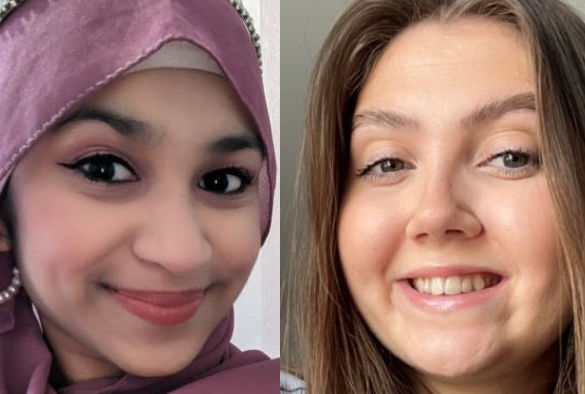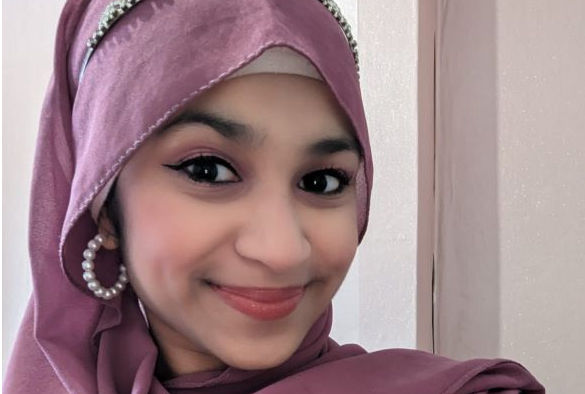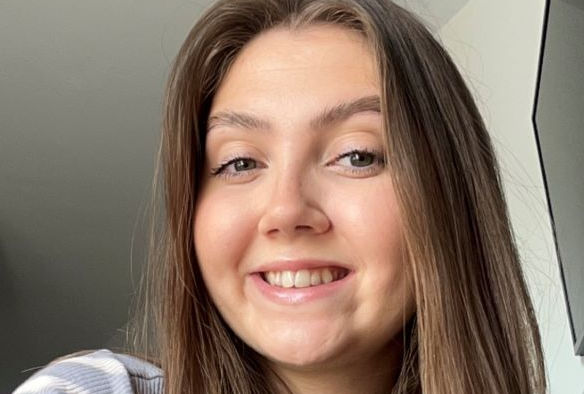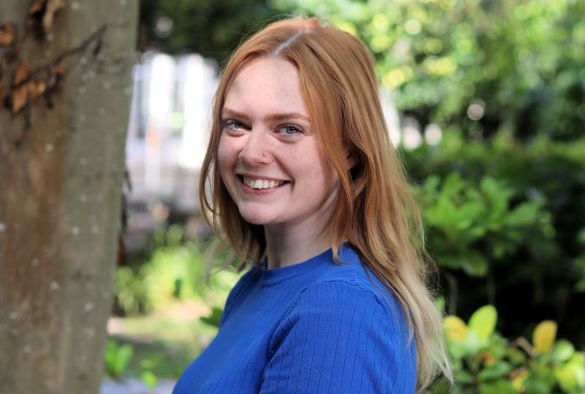
This summer Jasmine Ahmed and Anna Huise, second-year BSc Psychology students, spent time on research internships under the supervision of Dr Leanne Jackson, a lecturer in the Department of Psychology.
They were both awarded the opportunity to take part in a British Psychological Society (BPS) summer internship at the University of Liverpool.
Jasmine worked on a research project titled 'Investigating the relationship between Obsessive Compulsive Disorder (OCD) tendencies, anxiety, depression, and mother-infant bonding', while Anna's research project was titled: 'Exploring the role of maternal grandparents on infant feeding experiences.'
Here, Jasmine, Anna, and Dr Jackson discuss their summer internships, conducting research projects in the Department of Psychology, and how it felt to be awarded a British Psychological Society (BPS) internship.
How did you become involved with the summer internship programme?
Jasmine: I saw it on the Psychology Student Experience Newsletter and I thought it would be a really good way to get experience in different fields, as I'd already worked with Leanne from the start of the year. I thought it would be a nice way to continue working with her and also take a look at other projects she was working on.
Anna: I got an email at the end of January advertising it and then at the start of February, we started looking at different dissertation groups and supervisors. I thought it would be a great way to get experience and I do want to go into research. I know how important experience is, so I emailed Leanne, as that's the area of interest that I've got.

Jasmine Ahmed recently completed a summer internship at the Department of Psychology.
What are your research projects about?
Jasmine: We're working on a qualitative and quantitative one. With the qualitative one, we're looking at grandparent's experiences - so intergenerational breastfeeding - how grandparent's experiences can affect the children and how they then go on to breastfeed. We're also doing a quantitative one - the one I'm looking at is 'Intrusive thoughts during pregnancy and postpartum'. OCD tendencies, anxiety, and seeing how that's affected. One main factor we are looking at is sleep. Sleep during pregnancy can affect the onset of intrusive thoughts.
Dr Jackson: I think Jasmine summarised it well. The only thing I would add is that both projects are based on ideas from previous students. One of my third-year project students from last year noticed a gap in the literature. There has been a lot of research looking at clinical OCD, post-natally, and how that affects the transition to new parenthood, but not so much in healthy populations of post-partum women and looking at sub-clinical levels of intrusive thoughts and OCD tendencies, which sparked this project initially.
When Jasmine mentioned her research interest, I thought this married up perfectly with this previous project. The work she has done in adding the sleep component is a really lovely addition. It's an idea I wouldn't have necessarily thought of including myself, so I'm always learning as well. It's great bringing in interns, as you can bring in a fresh perspective.

Anna Huish recently completed a summer internship at the Department of Psychology.
What are your day-to-day tasks?
Anna: My main tasks have been recruitment for the grandparent qualitative study. I've been trying to recruit for that. I'm also recruiting for another quantitative pilot survey of Leanne's as well. That's been a big task. I've also been editing the introduction on the manuscript for that and then this week, I've been starting to read around the area and construct an introduction for another of Leanne's studies. I'm also going to be transcribing some interviews, so they've been my main day-to-day tasks.
Jasmine: Mine is quite similar. My main focus has been the transcription, so I've been doing a lot of transcriptions for the interviews and also been recruiting participants.
You were both awarded the BPS summer internship opportunity. How did that feel?
Jasmine: I was really excited. It's quite a prestigious thing. I had quite high hopes and when I did get it, I thought 'wow, I did actually get it.' It was nice to see that they did choose me because they don't give that out to a lot of people.
Anna: When I found out I got the funding, I was really excited too.
Dr Jackson: I did the internship myself between my second and third year, so it's full circle being able to pass the baton in a way. It was an experience like this with Dr Vicky Fallon and she took me under her wing in my first year. I don't think my career would have accelerated as quickly as it did if I didn't have those opportunities that did set me apart from other applicants. As you both said, you have an interest in research, with a particular focus on reproductive psychology. I think showing you have a contingency of interest from this early on will help to set you apart. It's nice being able to offer that training opportunity that I had, which led the pathway for something I'm passionate about as well.
Dr Leanne Jackson is a lecturer at the Department of Psychology and a previous summer intern.
What are the benefits of taking part in a summer internship for your studies and future employability?
Anna: We're always told psychology is a competitive field and it's so essential to gain experience. I think this internship is such a great experience to have because I want to go into research. Being able to see the research process in the area that I'm interested in. There are things I didn't know before, like how long the recruitment process can take and also how writing a report for a journal can differ from an Undergraduate report. These are things I wouldn't know if I hadn't done the internship and it's important to know that for my future career.
Jasmine: Very similar to Anna in terms of the experience. I like doing the transcriptions, because even though we do that with one of our modules in psychology, I think it's different when you're doing it with a study. They're usually longer and you're looking at more raw data. With the manuscripts, you see how it works for the journal. One of my main factors was that it stands out a bit more.
What advice would you give to students who want to take part in a summer internship?
Anna: I would say going to the lectures where supervisors came in and spoke about their research areas and then going away and reading their previous research helped me decide where your research interest is. Then you can email them.
Jasmine: Email a lot of supervisors. Email everyone who you think you have a shared research interest with. Don't just stick with one person. Talk to lots of different supervisors, get a feel of what they all do and get some meetings. Get some information, go for it and just apply.
